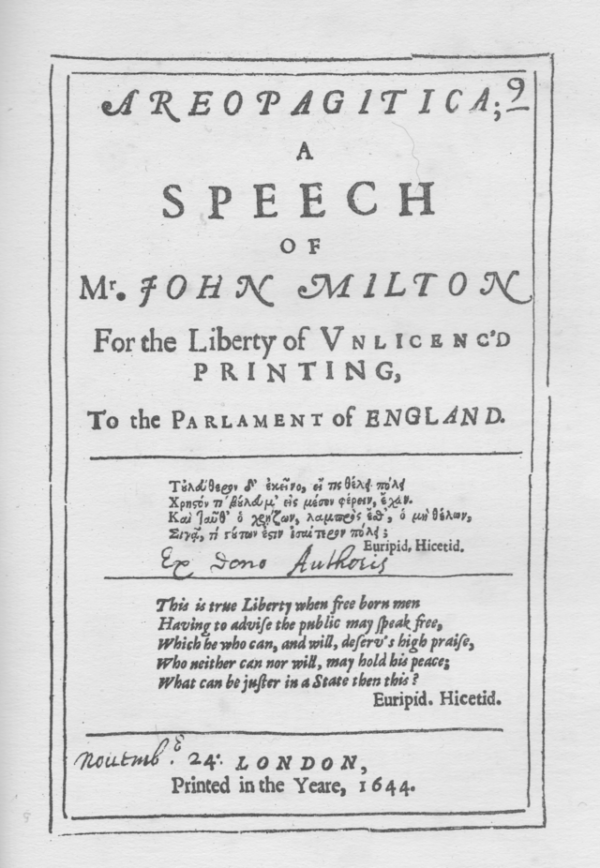On November 23, 1644, John Milton, the renowned English poet and intellectual, published Areopagitica, a pamphlet that would go on to become one of history’s most eloquent and enduring defenses of free speech and a powerful critique of censorship. Written during a time of significant political and social upheaval, Milton’s arguments laid the groundwork for modern debates about freedom of expression and the press.
The publication of Areopagitica occurred during the English Civil War, a period marked by deep divisions between King Charles I and Parliament. Amid the conflict, Parliament sought to strengthen its authority, and one of its measures was the Licensing Order of 1643. This order reinstated pre-publication censorship, requiring government approval before any written work could be published. For Milton, a staunch Puritan who initially supported Parliament’s cause, this move was deeply troubling. His disillusionment with Parliament’s oppressive tactics, despite his earlier alignment with its goals, led him to pen Areopagitica.
The pamphlet’s title was inspired by the Areopagus, an ancient Athenian council known for its commitment to governance and justice. This reference highlighted Milton’s intent to appeal to reason and moral authority. Addressing Parliament directly, Areopagitica presented a compelling argument against censorship, blending passionate rhetoric, classical allusions, and logical reasoning.
Milton argued that censorship not only oppressed intellectual freedom but also hindered the pursuit of truth. He believed that truth and falsehood must be allowed to compete openly, asserting that only through such a free exchange could intellectual growth and the discovery of truth occur. He famously wrote, “Let [truth] and Falsehood grapple; who ever knew Truth put to the worse, in a free and open encounter?” This belief in the resilience of truth formed the foundation of his case against censorship.
Milton further warned that pre-publication licensing would discourage authors, stifle creativity, and limit the spread of knowledge. He saw censorship as a threat to societal progress, emphasizing that true virtue and wisdom arise not from shielding individuals from controversial ideas but from allowing them to engage with and discern right from wrong. Drawing on historical precedents, he pointed to the intellectual vibrancy of ancient Greece and Rome, where freedom of expression was valued, as evidence of the benefits of open discourse.
Despite the eloquence and force of his arguments, Areopagitica did not achieve its immediate goal of repealing the Licensing Order. Parliament’s policy remained in place. Yet the pamphlet’s influence far outlasted the political moment in which it was written. Over the centuries, Areopagitica has become a cornerstone text in the fight for intellectual freedom. Its ideas resonated with Enlightenment thinkers like John Locke and Thomas Jefferson, whose writings helped shape democratic principles, including the First Amendment to the United States Constitution.
In today’s digital age, Milton’s vision continues to hold relevance. Debates about censorship—whether related to social media platforms, government regulation, or freedom of the press—echo the themes Milton explored nearly four centuries ago. His insistence on the resilience of truth and the necessity of open discourse serves as a guiding principle for those advocating intellectual and creative freedom.
The publication of Areopagitica on November 23, 1644, stands as a significant moment in the history of free expression. Milton’s eloquent plea against censorship articulated ideals that remain vital to democratic societies. His work reminds us that progress depends not on suppressing dissent but on engaging with it, fostering an environment where ideas can be freely shared and challenged. As we reflect on this day in history, Milton’s Areopagitica continues to inspire and affirm the enduring importance of the free exchange of ideas.






